Excerpt:奧維德的《變形記》
這時四面八方的燈火都紛紛熄滅了。在林蔭大道的樹蔭下,在神秘莫測的黑影中,越來越稀少的行人在躑躅,幾乎分辨不出來。不時有個女人的身影走到斯萬跟前,在他耳邊嘟嚷兩句,請他送她回家,把斯萬嚇了一跳。他惶惶不安地從這些暗淡的身子邊擦過,彷彿是在黑暗的王國,在鬼魂叢中尋找歐律狄克一般。……
(p.251~253 追憶似水年華 I 在斯萬家那邊 聯經版 1992)
從小間或讀過一些不同版本的希臘及羅馬神話,卻一直不知道奧維德的《變形記》也是淵源於希臘羅馬神話的經典作品。
前一陣子,讀完蓋文‧法蘭西斯 (Gavin Francis) 的《變形記:一部醫學與人體變化的文化史》,這才驚覺自己應該找到這本書一探究竟。
以下摘要 Daedalus and Icarus、Orpheus and Eurydice 以及 Midas,是我個人比較喜歡的幾個故事,請大家共賞。
https://en.wikipedia.org/wiki/Metamorphoses
Metamorphoses
The Metamorphoses (Latin: Metamorphoseon libri: "Books of Transformations") is an 8 AD Latin narrative poem by the Roman poet Ovid, considered his magnum opus. Comprising 11,995 lines, 15 books and over 250 myths, the poem chronicles the history of the world from its creation to the deification of Julius Caesar within a loose mythico-historical framework.
https://zh.wikipedia.org/wiki/%E5%8F%98%E5%BD%A2%E8%AE%B0_(%E5%A5%A5%E7%BB%B4%E5%BE%B7)
變形記 (奧維德)
《變形記》(拉丁語:Metamorphoseon libri)是羅馬的詩人奧維德的作品,大約開始寫於公元1年或3年,完成於公元8年,是使用六步格詩體記錄了關於變形的神話作品。《變形記》有15冊,每冊大概700到900行,描述了羅馬和希臘神話中的世界歷史。其中總共包括了大約250個左右的傳說(多為愛情故事)。從其第一次發行開始,《變形記》就成為了最受歡迎的神話作品之一,也大受中世紀的作家和詩人的喜愛,因此其對中世紀的文學作品以及中世紀甚至到巴羅克時期的繪畫藝術有深遠的影響。
全詩共十五卷,取材於古希臘羅馬神話,根據古希臘哲學家畢達哥拉斯的「靈魂轉回」理論,變形,即人由於某種原因被變成動物、植物、星星、石頭等這一線索貫穿全書,是古希臘羅馬神話的大匯集。故事按照時間順序敘述,由宇宙的創立、大地的形成、人類的出現開始,直至羅馬的建立,凱撒遇刺變為星辰和奧古斯都順應天意建立統治為止。
https://www.books.com.tw/products/0010414510
變形記
Metamorphoseon
作者:奧維德
原文作者:Publius Ovidius Naso
譯者:呂健忠
出版社:書林出版有限公司
出版日期:2008/09/01
語言:繁體中文
《變形記》是奧維德的代表作,全詩15卷,結構可分為序詩、宇宙的開創、神的故事、男女英雄的故事、歷史人物的事跡、結尾。內容取材於古希臘羅馬神話,根據古希臘哲學家畢達哥拉斯的“靈魂輪迴”理論,用變形,即人由於某種原因被變成動物、植物、星星、石頭等這一線索貫穿全書,共包括大小故事250多個(其中以愛情故事為主)。
作者簡介
奧維德 Publius Ovidius Naso (Ovid),(43 BC-AD17)
以「博學詩人」知名的羅馬帝國才子,因不忍辜負天生的才華而放棄安穩的公職生涯。取材於熱戀之道推出的「愛經四書」奠定了他在當代詩壇的地位,也使他發覺自己洞識所在為情場男女的心理狀態。基於對女人處境的同情,他描寫女性的心理入木三分,這在虛擬為情所困的《擬情詩》中發揮得淋漓盡致。完成名山事業所繫的《變形記》之後,生平最後九年受奧古斯都文字獄之害,流放期間客死於黑海之濱。他的創作可分為三個時期,早期作品主要是用哀歌體格律寫成的各種愛情詩,包括《戀歌》、《列女志》、《愛的藝術》、《論容飾》、《愛的醫療》等。 創作成熟時期的作品是長詩《變形記》和《歲時記》。 後期作品主要是《哀歌》和《黑海零簡》。
【Excerpt】
Bk I:1-20 The Primal Chaos
I want to speak about bodies changed into new forms. You, gods, since you are the ones who alter these, and all other things, inspire my attempt, and spin out a continuous thread of words, from the worlds first origins to my own time.
〈序詩:主題與呼告 (1-4)〉
我來歌唱形體的變化!天界眾神啊,既然是你們造就這一切改變,請灌注靈氣,使我的變化書經緯穿梭,從開天闢地一路編織到當今!
Bk VIII:183-235 Daedalus and Icarus
…
And now Samos, sacred to Juno, lay ahead to the left (Delos and Paros were behind them), Lebinthos, and Calymne, rich in honey, to the right, when the boy began to delight in his daring flight, and abandoning his guide, drawn by desire for the heavens, soared higher. His nearness to the devouring sun softened the fragrant wax that held the wings: and the wax melted: he flailed with bare arms, but losing his oar-like wings, could not ride the air. Even as his mouth was crying his father’s name, it vanished into the dark blue sea, the Icarian Sea, called after him. The unhappy father, now no longer a father, shouted ‘Icarus, Icarus where are you? Which way should I be looking, to see you?’ ‘Icarus’ he called again. Then he caught sight of the feathers on the waves, and cursed his inventions. He laid the body to rest, in a tomb, and the island was named Icaria after his buried child.
〈戴達洛斯與伊卡若斯〉
……
朱諾的聖島薩摩斯映入眼簾,在這一對父子的左手邊,提洛和帕若斯島早已不見蹤影,右邊冒出列賓托斯和盛產蜂蜜的卡林聶這兩個島的時候,伊卡若斯越飛越起勁,無暇兼顧在前面帶路的老爸,心裡只盼望漫遊無邊無際的天空,越飛越高。太陽越來越近,羽蠟無法承受灼熱的陽光,邊融化邊釋出芳香,翅膀開始解離。伊卡若斯努力拍動手臂,拍動的卻是裸臂,羽毛掉光了,再也無法飄浮。「爸爸!」他一叫再叫,可是他的叫聲沉溺在深藍的水域,後人就用他的名字稱呼他落水的地方。
不幸的父親,如今不再是個父親,只能拼命呼叫:「伊卡若斯!伊卡若斯,你在哪裡?我到什麼地方去找你,伊卡若斯?」喊著喊著,他掃描散落在海面的羽毛,忍不住詛咒自己的發明。他就近找了個島埋葬愛子的屍體,造了墳。為了紀念他,那個島就叫作伊卡里亞。
Bk X:1-85 Orpheus and Eurydice
…
The bloodless spirits wept as he spoke, accompanying his words with the music. Tantalus did not reach for the ever-retreating water: Ixion’s wheel was stilled: the vultures did not pluck at Tityus’s liver: the Belides, the daughters of Danaüs, left their water jars: and you, Sisyphus, perched there, on your rock. Then they say, for the first time, the faces of the Furies were wet with tears, won over by his song: the king of the deep, and his royal bride, could not bear to refuse his prayer, and called for Eurydice.
She was among the recent ghosts, and walked haltingly from her wound. The poet of Rhodope received her, and, at the same time, accepted this condition, that he must not turn his eyes behind him, until he emerged from the vale of Avernus, or the gift would be null and void.
They took the upward path, through the still silence, steep and dark, shadowy with dense fog, drawing near to the threshold of the upper world. Afraid she was no longer there, and eager to see her, the lover turned his eyes. In an instant she dropped back, and he, unhappy man, stretching out his arms to hold her and be held, clutched at nothing but the receding air. Dying a second time, now, there was no complaint to her husband (what, then, could she complain of, except that she had been loved?). She spoke a last ‘farewell’ that, now, scarcely reached his ears, and turned again towards that same place.
〈奧斐斯入冥尋妻〉
……
他邊唱邊彈抱琴,沒有血色的亡魂聞歌落淚:坦塔洛斯再也沒想到要抓住流水,伊克西翁的輪子驚訝得靜止不動,老鷹停止啄食提梯俄斯的肝,貝洛斯的孫女手握水罐就地休息,而你,席敘佛斯,你在石頭上坐了下來。復仇女神忍不住掉下眼淚,據說這是她們的第一次。冥后和冥王忍不下心拒絕他的懇求,喚出尤瑞迪柯。她雜在陰間新添的亡魂行列,因腳傷而不良於行。這位色雷斯英雄伸手接受他的妻子,也接受了他們的條件:離開陰陽交界的阿維努斯之前,他不許回頭看,否則承諾失效。
他們走上坡的路,穿越死寂,在層墨疊黑中爬上陡峭的幽冥道,已經來到臨近上界的邊區。他擔心她也許跟不上,急於看她,心懷愛憐一回頭,她轉眼間滑落深淵。他急忙伸出手臂要拉她一把,不然就是讓她抓;不幸的是,他兩手一撲,除了輕飄飄的空氣,什麼也沒有。又死亡一次,她對丈夫沒有半句怨言;有什麼好抱怨的呢?要怪只能怪丈夫愛她。她最後一次說出的「珍重再見」幾乎傳不到丈夫的耳朵,就掉落到來時地。
Bk XI:85-145 Midas and the golden touch
…
His own mind could scarcely contain his expectations, dreaming of all things golden. As he was exulting, his servants set a table before him, heaped with cooked food, and loaves were not lacking. Then, indeed, if he touched the gift of Ceres with his hand, her gift hardened. If he tried, with eager bites, to tear the food, the food was covered with a yellow surface where his teeth touched. He mixed pure water with wine, the other gift of his benefactor, but molten gold could be seen trickling through his lips.
Dismayed by this strange misfortune, rich and unhappy, he tries to flee his riches, and hates what he wished for a moment ago. No abundance can relieve his famine: his throat is parched with burning thirst, and, justly, he is tortured by the hateful gold. Lifting his shining hands and arms to heaven, he cries out: ‘Father, Bacchus, forgive me! I have sinned. But have pity on me, I beg you, and save me from this costly evil!’ The will of the gods is kindly. Bacchus, when he confessed his fault restored him, and took back what he had given in fulfilment of his promise. ‘So you do not remain coated with the gold you wished for so foolishly,’ he said, ‘go to the river by great Sardis, make your way up the bright ridge against the falling waters, till you come to the source of the stream, and plunge your head and body at the same moment into the foaming fountain, where it gushes out, and at the same time wash away your sin.’ The king went to the river as he was ordered: the golden virtue coloured the waters, and passed from his human body into the stream. Even now, gathering the grains of gold from the ancient vein, the fields harden, their soil soaked by the pale yellow waters.
〈米達斯觸物成金的噩夢〉
……
夢想一個黃金世界,他的希望有如脫韁的野馬,連思慮也望塵莫及。他歡天喜地陶醉在美夢成真的世界。這時候,他的僕人已經把一桌山珍海味擺在他面前,麵包當然不缺。可是,他的手一碰到麵包,柯瑞絲的賞賜立刻變硬;他張口咬肉一咬下去,竟然咬到黃橙橙的金塊。他倒水稀釋酒——使他心願實現的恩主——張口一喝,你會看到熔化了的黃金流進他的喉嚨。
事情太詭異了!他驚訝得說不出話。他富足卻可憐,開始想辦法要逃離他的財富,開始厭惡他夢寐以求的願望。再多的食物也解除不了他的饑餓,他口乾舌燥,飽受黃金折磨卻怨不得別人。他開始討厭黃金,高高舉起手臂,向天祈求:「列耐厄斯神主啊,原諒我吧,我錯了!可憐可憐我吧,幫我解除使我目眩神迷的詛咒吧!」
神可以為善:巴可斯聽到米達斯認錯,立刻回收禮物,化解噩夢。巴可斯告訴他:「不想被禁錮在你盲目選擇的黃金世界,你得前往流經薩爾底斯的那條河流,沿著水勢浩浩蕩蕩的河道逆向而行,爬坡追溯到源頭。在那裡,連身帶頭整個人浸泡在霧花飛濺的水源,讓最強勁的水流洗滌你的罪。」
米達斯依照指示抵達河源,依照指示滌罪。他跳下水,水源受到感染,觸物成金的魔力從人身轉移到河水。古老的水脈源源不絕,河水流經之地總是一片金黃,一直到今天仍然是金沙耀眼。
Bk XV:871-879 Ovid’s Envoi
And now the work is done, that Jupiter’s anger, fire or sword cannot erase, nor the gnawing tooth of time. Let that day, that only has power over my body, end, when it will, my uncertain span of years: yet the best part of me will be borne, immortal, beyond the distant stars. Wherever Rome’s influence extends, over the lands it has civilised, I will be spoken, on people’s lips: and, famous through all the ages, if there is truth in poet’s prophecies, –vivam - I shall live.
〈跋詩 (871-879)〉
我的作品已經完成,周夫的怒火、烈焰、刀劍或時間的腐蝕作用都毀滅不了。生也有涯,大限之日終將到來,我如今死而無憾。我生命中比較高貴的部分將會獲得永生,飛揚超越眾星的高度;我的名字將會永垂不朽。羅馬勢力橫掃所及之地,我將在世人的口碑流傳,而且如果詩人的預言有道理,我的聲譽將世世代代永遠留芳。
https://ovid.lib.virginia.edu/trans/Ovhome.htm
Ovids Metamorphoses, tr. Anthony S. Kline
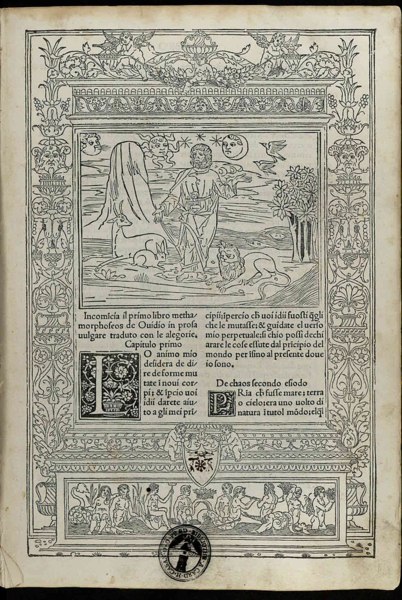
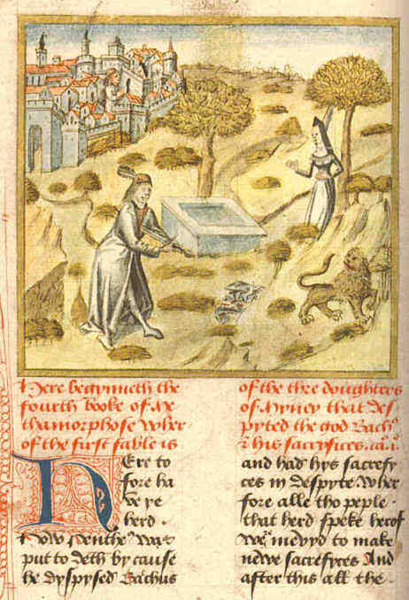
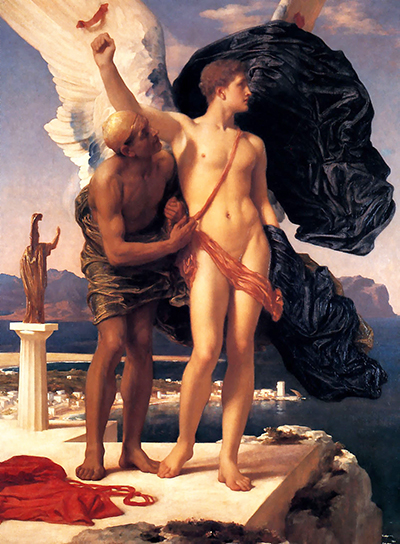
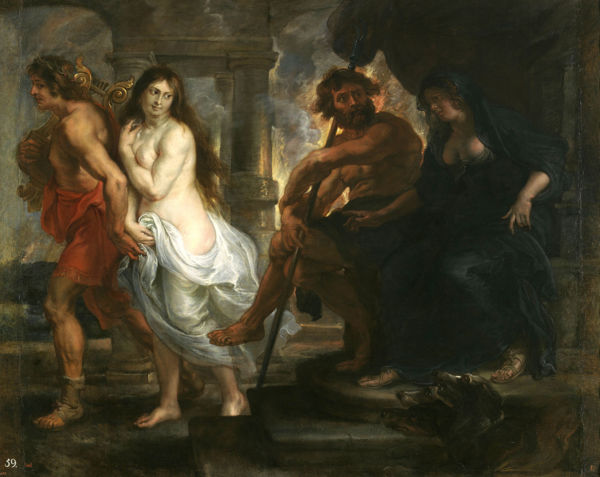
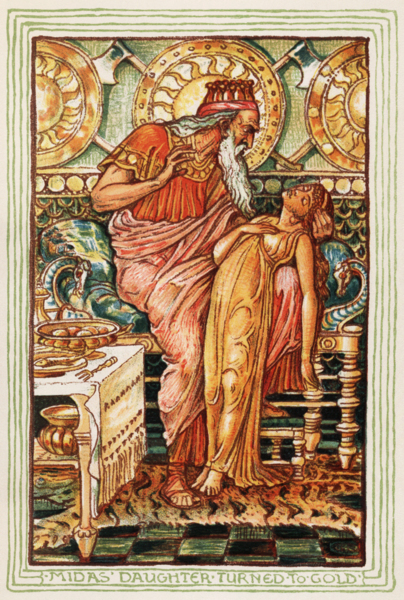
限會員,要發表迴響,請先登入












